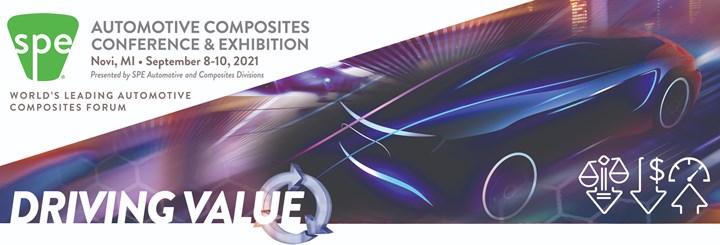SPE ACCE announces call for student poster competition abstracts
Annual competition invites grad, undergrad, community college and high school students to submit poster topics on innovative composite technologies for automotive and ground transportation.

Photo Credit: SPE ACCE
The organizing committee for the Society of Plastics Engineers (SPE, Brookfield, Conn., U.S.) Automotive Composites Conference & Expo (ACCE, Detroit, Mich., U.S.) invites graduate, undergraduate, community college and high school students to submit abstracts on innovative composites technologies, for automotive and ground transportation, for its annual student poster competition. The competition will be held during the ACCE at the Suburban Collection Showplace in Novi, Michigan (in the Detroit suburbs) Sept. 8-10, 2021.
Industry-expert judges, SPE board members and members of the media will review all posters with student authors on the first day of the conference, Sept. 8, 2021. First-, second-, and third-place awards will be presented to winners in graduate, undergraduate and high school categories during a special ceremony on the event’s second day, Sept. 9, 2021.
Students interested in participating in the competition should contact Dr. Uday Vaidya at ACCEposters@speautomotive.com. Vaidya is the ACCE student poster competition chair as well as CTO of Institute for Advanced Composites Manufacturing Innovation (IACMI, Knoxville, Tenn., U.S.) and professor and governor’s chair of Advanced Composites Manufacturing at the University of Tennessee-Knoxville.
Abstracts are due by July 1, 2021. Digital copies of posters are due by August 20, 2021 for pre-review by judges. Students will need to bring printed copies of their posters to the conference, which they can attend free of charge. All students in the competition will also receive a partial travel stipend and a shared hotel room provided by SPE, as well as free student membership in SPE.
Large multi-poster panels and push pins for displaying the posters in the Student Poster Display area will be provided. SPE organizers add that the show also provides excellent networking opportunities for those close to graduating who are starting to look for a job. The poster template is online here.
Poster topics may include subjects such as:
- Automotive composites
- Composites and lightweight materials for trucks
- Bio-composites
- Nanocomposites
- Glass, carbon, and hybrid fibers
- Thermoset and thermoplastic technologies
- Recycling and green technologies
- Multi-materials
- Joining technologies
- Modeling and analysis of lightweight materials
- CAFE standards and mandates
- Cost-effective manufacturing
- Use of advanced materials in innovative applications
- Virtual prototyping and design
- Microstructure, failure and fracture
- Failure envelopes and theories
- Additive manufacturing of composites
Students and their posters are ranked according to the following criteria:
- Content (student and poster demonstrate clarity of topic, objectives and background);
- Motivation for research and technical relevance to conference theme;
- Methodology and approach to problem;
- Quality of proposed research results/findings;
- Conclusions are supported by information presented;
- Presentation (display aesthetics are pleasing and there is a logical flow between sections);
- Knowledgeable (presenter has a good grasp of the subject);
- Understandability (poster is effective even without student being present to explain it); and
-
Overall rank versus other posters and presenters.
Related Content
-
Infinite Composites: Type V tanks for space, hydrogen, automotive and more
After a decade of proving its linerless, weight-saving composite tanks with NASA and more than 30 aerospace companies, this CryoSphere pioneer is scaling for growth in commercial space and sustainable transportation on Earth.
-
“Structured air” TPS safeguards composite structures
Powered by an 85% air/15% pure polyimide aerogel, Blueshift’s novel material system protects structures during transient thermal events from -200°C to beyond 2400°C for rockets, battery boxes and more.
-
SMC composites progress BinC solar electric vehicles
In an interview with one of Aptera’s co-founders, CW sheds light on the inspiration behind the crowd-funded solar electric vehicle, its body in carbon (BinC) and how composite materials are playing a role in its design.













